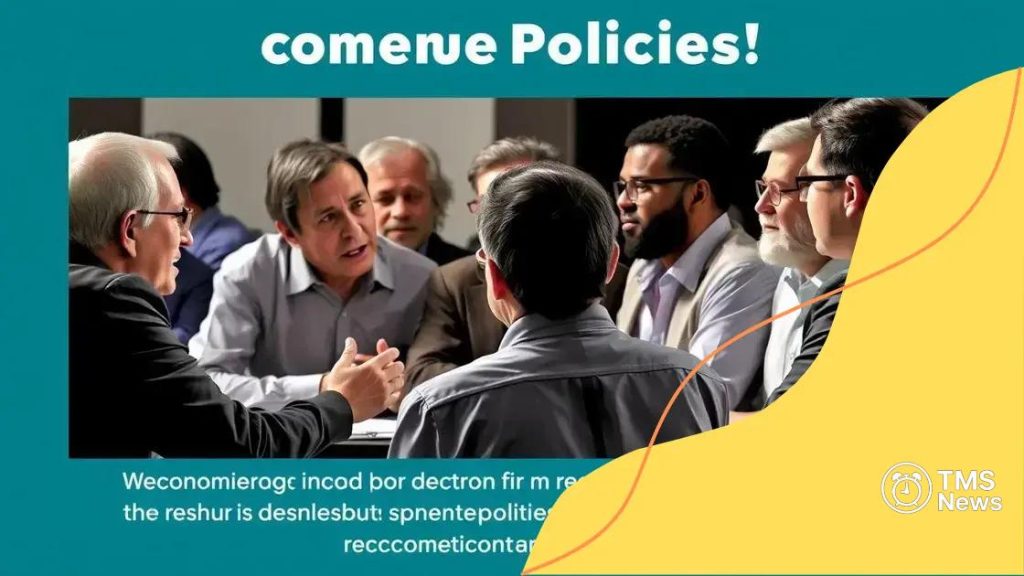Fiscal conservatives opposition: Understanding the impact

Anúncios
Fiscal conservatives oppose excessive government spending, advocating for lower taxes and a balanced budget to foster economic growth and ensure responsible use of taxpayer funds.
Fiscal conservatives opposition plays a crucial role in shaping economic debates today. It’s fascinating to see how differing perspectives can influence public policy. Have you considered how this affects our financial future?
Anúncios
Defining fiscal conservatives
Defining fiscal conservatives is essential to understand their role in economic discussions. These individuals advocate for limited government spending, lower taxes, and a balanced budget. Their perspectives shape public policies and influence voter opinions.
Fiscal conservatives believe that government intervention can lead to inefficiencies and misallocation of resources. They argue that allowing the market to operate freely fosters economic growth and innovation. This viewpoint is often tied to a broader philosophy of personal responsibility.
Core Principles of Fiscal Conservatism
At the heart of fiscal conservatism are several key principles:
Anúncios
- Limited Government: Fiscal conservatives argue that government should play a minimal role in the economy.
- Lower Taxes: They contend that keeping taxes low spurs economic growth by allowing individuals to keep more of their earnings.
- Balanced Budget: Maintaining a balanced budget is crucial to avoid excessive government debt.
- Market Efficiency: They believe that free markets, when left to their own devices, allocate resources more effectively than government control.
Furthermore, fiscal conservatives focus on reducing government waste and ensuring that public funds are used efficiently. They often cite examples of government programs that they consider ineffective as a call to action.
Historical Context
Historically, fiscal conservatism emerged as a response to increasing government intervention in the economy. This movement gained momentum during the late 20th century, particularly with the rise of figures advocating for deregulation and tax cuts.
As we continue to explore this topic, it is critical to comprehend how fiscal conservatives’ ideologies impact fiscal policies, especially in today’s polarized political climate. Understanding their definitions sets the groundwork for analyzing the ongoing debates surrounding government spending and taxation.
Historical context of fiscal conservatives opposition
Understanding the historical context of fiscal conservatives’ opposition helps to unpack the evolution of economic policies over time. This opposition has roots in various economic theories and political movements that emphasize limited government intervention.
In the early 20th century, as government roles expanded during the Progressive Era, fiscal conservatives began to voice concerns. They argued that increased spending and regulation might hinder economic growth and personal freedoms. This perspective gained traction during times of economic turmoil, where fiscal discipline became increasingly important.
The Rise of Fiscal Conservatism
Fiscal conservatism gained momentum during pivotal moments in U.S. history:
- The Great Depression: The economic downturn led to massive government programs, igniting debates about the effectiveness of government spending.
- The Reagan Era: During the 1980s, tax cuts and deregulation became central themes, reinforcing the fiscal conservative agenda.
- The 2008 Financial Crisis: The response to the crisis reignited discussions on government intervention, with many fiscal conservatives advocating for reduced spending to stimulate recovery.
As we delve deeper into the past of fiscal conservatives’ opposition, it’s essential to note that this movement has often been a reaction against perceived government overreach. The debates have not only shaped economic policies but have also influenced the political landscape.
Key Events Fueling Opposition
Several key events throughout history have fueled the opposition of fiscal conservatives: the introduction of welfare programs, the rise of regulatory agencies, and increasing national debt have all been focal points. As these developments occurred, fiscal conservatives argued that they led to unsustainable economic practices.
Moreover, they often cite historical data showing the correlation between government spending and economic stagnation. This belief continues to drive their opposition in current debates about fiscal responsibility and government expenditure.
Key arguments from fiscal conservatives

Understanding the key arguments from fiscal conservatives helps clarify their economic philosophy. These arguments often focus on promoting economic growth and reducing government intervention.
Fiscal conservatives argue that a smaller government is more efficient. They believe that when the government has fewer resources, it must allocate them wisely. This encourages responsibility and innovation in both public and private sectors. Many argue that excessive government spending leads to higher taxes and undermines individual freedoms.
Core Arguments of Fiscal Conservatives
Here are some of the core arguments often presented by fiscal conservatives:
- Lower Taxes: They assert that lower taxes stimulate economic activity. When people keep more of their earnings, they are more likely to spend and invest.
- Reduced Government Spending: Fiscal conservatives claim that a decrease in government spending can lead to a more a balanced budget and less national debt.
- Free Market Principles: They advocate for free market policies, arguing that competition drives efficiency and innovation.
- Personal Responsibility: They highlight that individuals should be responsible for their financial decisions, reducing reliance on government aid.
Many fiscal conservatives point to historical examples that support their beliefs. For instance, during the Reagan administration, tax cuts were implemented, which they argue spurred economic growth. The belief is that a thriving private sector leads to job creation and increased economic productivity.
Government Overreach Concerns
Concerns about government overreach are another key argument for fiscal conservatives. They assert that excessive regulations and programs can stifle economic growth. By limiting government intervention, fiscal conservatives claim that businesses are more free to innovate and respond to market demands.
The overarching message from fiscal conservatives is that economic freedom fosters prosperity. They argue that when individuals and businesses are free from over-regulation and high taxes, the economy can flourish.
Impact on government spending
The impact on government spending is a critical issue for fiscal conservatives. They assert that prudent management of funds is essential to a healthy economy. This approach emphasizes reducing unnecessary expenditures to ensure that taxpayer dollars are used effectively.
Fiscal conservatives argue that high government spending often leads to budget deficits. These deficits can result in increased debt, which burdens future generations. They advocate for policies that prioritize essential services while cutting wasteful spending.
Budget Cuts and Their Effects
In times of financial strain, fiscal conservatives often propose budget cuts. The aim of these cuts is to:
- Reduce National Debt: By cutting spending, they believe the government can lower its debt burden.
- Promote Economic Growth: Lower expenditures allow for more investment in the private sector, driving job creation.
- Encourage Fiscal Responsibility: Smaller budgets foster a culture of accountability in government.
This ideology led to significant changes in various government programs. For instance, during economic downturns, many fiscal conservatives called for a reassessment of social programs to ensure funds were allocated effectively.
Long-term Consequences of Spending Policies
Moreover, fiscal conservatives maintain that government spending can stifle economic growth by crowding out private investment. When governments spend excessively, they argue that it can lead to higher taxes, diminishing individuals’ capacity to invest in businesses.
In addition, fiscal conservatism encourages the idea that a limited government role in the economy leads to more sustainable growth. By minimizing spending, the government can create a favorable environment for businesses to thrive, leading to more jobs and better wages for workers. This cycle reinforces the argument for maintaining disciplined spending practices.
Future of fiscal policy amidst opposition
The future of fiscal policy amidst opposition presents a complex landscape for lawmakers and economists. As fiscal conservatives continue to push back against expansive government spending, the dynamics of policy-making are evolving. Understanding these tensions is crucial for anticipating the direction of economic strategies.
With concerns about budget deficits and national debt, fiscal conservatives are advocating for policies that emphasize fiscal discipline. They are calling for a reassessment of current spending priorities to ensure that taxpayer funds are used efficiently. This shift could lead to significant changes in how government programs are funded.
Shifts in Political Climate
The political climate significantly influences the future of fiscal policy. As elections approach, discussions around fiscal responsibility become more prominent. Voters increasingly demand accountability from their representatives regarding how public funds are spent.
Here are some potential outcomes of the evolving political landscape:
- Increased Pressure for Budget Cuts: As public concern about debt rises, there may be intensified pressure on policymakers to cut non-essential spending.
- Focus on Tax Reform: Fiscal conservatives are likely to continue advocating for tax reforms that promote economic growth while ensuring government revenue.
- Partisan Divides: The growing divide between political parties may lead to gridlock in passing significant fiscal reforms.
This political landscape suggests that while fiscal conservatives may face opposition, their influence could also push for reforms that reshape fiscal policy in manageable and sustainable ways.
Economic Recovery and Sustainability
As we look toward the future, the relationship between fiscal policy and economic recovery will be paramount. A cautious approach may be necessary to ensure that public spending does not hinder economic growth. Fiscal conservatives believe that prioritizing effective allocation of resources can foster a more resilient economy.
This vision includes not just short-term fixes but also sustainable long-term strategies. Policymakers must balance immediate needs with the long-term health of the economy, creating a nurturing environment for both businesses and consumers.
FAQ – Questions about Fiscal Conservatism and Government Spending
What is fiscal conservatism?
Fiscal conservatism is an economic philosophy that advocates for lower taxes, reduced government spending, and a balanced budget to enhance economic growth.
How does government spending affect the economy?
Excessive government spending can lead to budget deficits and increased national debt, which may hinder economic growth.
What are potential outcomes of fiscal policy changes?
Changes in fiscal policy may result in budget cuts, tax reforms, and shifts in government programs, impacting overall economic stability.
Why is fiscal discipline important?
Fiscal discipline promotes responsible management of taxpayer money, ensuring funds are used effectively and helping to avoid future financial crises.





